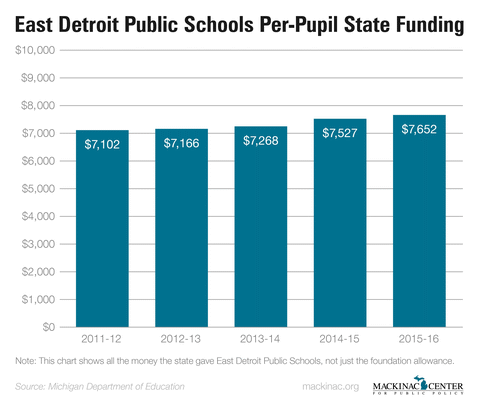Academic Failure Forces Charter School Closure
When did this ever happen in a traditional public school?
Allen Academy, a charter school in the city of Detroit, will close its doors due to poor academic performance, according to the Michigan Association of Public School Academies. The school had 898 students this past school year. It opened in 2003.
A Michigan charter school shutting down because it didn’t make the grade shouldn’t be news — a few open and a few close every year for various reasons. But it might be news in the newsrooms of media outlets that have been critical of allegedly lax oversight that permits failing charter schools to stay open.
For example, in May, The Atlantic magazine erroneously reported: “In reality, the operators of Detroit’s charter schools almost never close them because of poor academic performance. So even a school where no child is achieving at grade level can continue enrolling new students.”
There were 27 charter schools within the city of Detroit that had closed as of August 2015, nine due to poor academic performance.
Gary Naeyaert, the executive director of the pro-charter Great Lakes Education Project, said the closing exposes a false narrative led by Detroit Mayor Mike Duggan and other Detroit elites that the charter sector is unregulated and running amok.
“The closure of Allen Academy proves that Michigan authorizers are closing charters that don’t live up to their promise,” Naeyaert said in an email. “We look forward to the day when traditional public schools are expected to actually teach students to read in order to stay open.”
Naeyaert says that in contrast, the state of Michigan has never closed a school due to academic reasons, a claim the Michigan Department of Education has not refuted.
Michigan Capitol Confidential is the news source produced by the Mackinac Center for Public Policy. Michigan Capitol Confidential reports with a free-market news perspective.


 Member of state ed board called for ending charter schools
Member of state ed board called for ending charter schools
 In Detroit schools, nothing succeeds like failure
In Detroit schools, nothing succeeds like failure
 Detroit charter network up for $1 million award
Detroit charter network up for $1 million award

 Wayne-Westland School District facing $30M deficit
Wayne-Westland School District facing $30M deficit
 Moolenaar bill would apply leftover COVID funds to the deficit
Moolenaar bill would apply leftover COVID funds to the deficit
 Fox2 Detroit misstates impact of declining school enrollment
Fox2 Detroit misstates impact of declining school enrollment